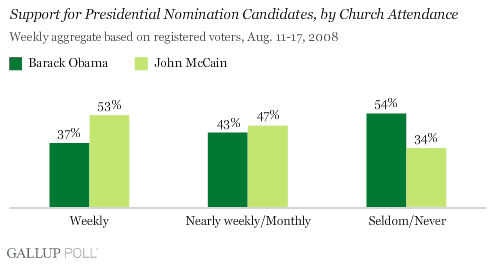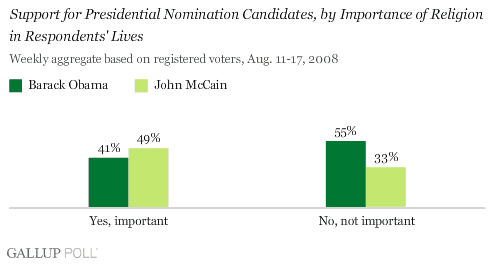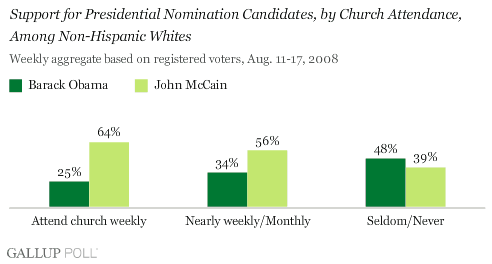PRINCETON, NJ -- John McCain continues to dominate Barack Obama among religious Americans, winning among those who attend worship services weekly by a 53% to 37% margin, and losing to Obama among those who seldom or never attend church by 54% to 34%.

Both presidential candidates appeared this past weekend at a "Civil Forum on the Presidency" at Saddleback Church in California, moderated by the church's pastor, Rick Warren. The candidates answered questions about their faith and other campaign and policy issues.
The Gallup data reviewed here (from a Gallup aggregate of interviews conducted Aug. 11-17) show that in terms of those in attendance at the church, McCain was likely more well-appreciated than Obama, as he no doubt was to religious voters around the country watching at home on television. Not only does McCain do much better against Obama among those who attend church frequently, but he also beats Obama by an 8-point margin among Americans who say religion is important in their lives, while Obama wins by a 22-point margin among those for whom religion is not important.

This strong relationship between religiosity and vote behavior is not new. In 2004, Gallup data from late October showed that George W. Bush was ahead of John Kerry by a 19-point margin among registered voters who were weekly church attenders, while Kerry was ahead by a 24-point margin among registered voters who seldom or never attended church.
Black Americans are both highly religious and highly likely to vote Democratic in presidential contests. Thus, when the data are restricted just to whites, the relationship between religion and the vote is even more pronounced.

Among whites, McCain has a very large 39-point margin among those who attend church weekly, while Obama still manages to win among whites who seldom or never attend church, albeit by a more modest 9-point margin. (In this same weekly aggregate, McCain beats Obama overall among whites by a 51% to 37% margin.)
Implications
The relationship between religiosity and identifying with the Republican Party has been so strong in recent years that there is little question McCain will do well among this group in November. The interesting question is more about the degree to which highly religious white Americans are excited by the McCain candidacy and therefore willing to work for his election and to turn out on Election Day. At this point, the estimate is that McCain is doing about as well among registered voters who are weekly church attenders as did Bush in 2004.
Survey Methods
Results are based on telephone interviews with 6,228 registered voters, aged 18 and older, and 5,202 non-Hispanic white registered voters, aged 18 and older, conducted Aug. 11-17, 2008. For results based on both of these samples, one can say with 95% confidence that the maximum margin of sampling error is ±2 percentage points.
Interviews are conducted with respondents on land-line telephones (for respondents with a land-line telephone) and cellular phones (for respondents who are cell-phone only).
In addition to sampling error, question wording and practical difficulties in conducting surveys can introduce error or bias into the findings of public opinion polls.
To provide feedback or suggestions about how to improve Gallup.com, please e-mail feedback@gallup.com.
